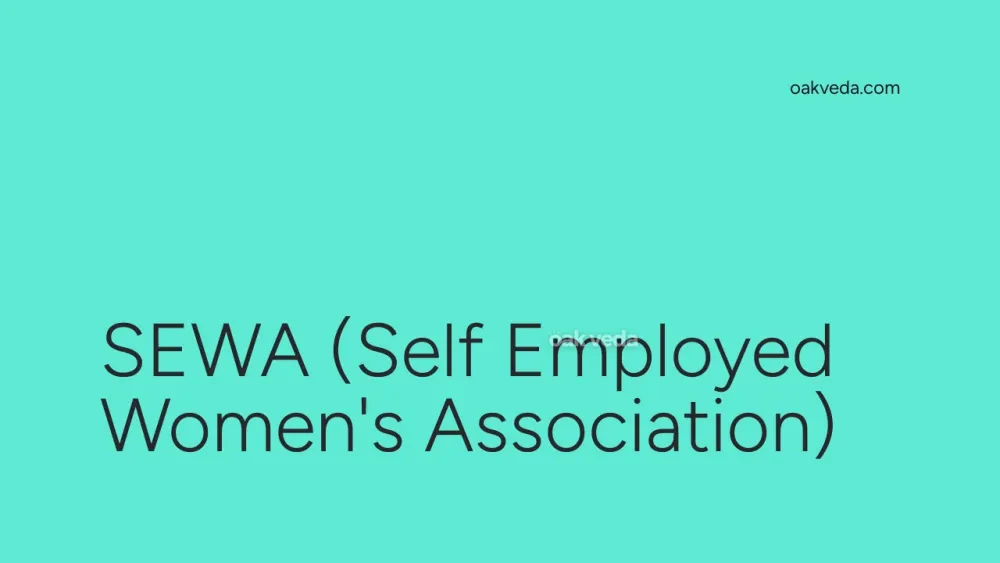
What is the Full Form of SEWA?
SEWA is the acronym for Self Employed Women's Association. This organization plays a crucial role in empowering low-income, self-employed women in India's informal sector.
What is Self Employed Women's Association?
The Self Employed Women's Association (SEWA) is a trade union and grassroots organization that focuses on improving the lives and livelihoods of women workers in the informal economy. Founded in 1972, SEWA has become a powerful force in advocating for the rights and economic empowerment of self-employed women across India.
Origin and Development of SEWA
SEWA was established in April 1972 under the visionary leadership of Ela Bhatt. It was registered as a trade union under the Indian Trade Unions Act of 1926. The organization emerged from the recognition that a significant portion of India's female workforce (over 94%) operates in the unorganized sector, often lacking the social security and benefits afforded to those in formal employment.
Since its inception, SEWA has grown from a small group of women in Gujarat to a nationwide movement with over 1.5 million members across several Indian states. This growth reflects the organization's success in addressing the needs of self-employed women and its ability to adapt to changing economic landscapes.
How does SEWA work?
SEWA operates on a unique model that combines the principles of trade unionism with cooperative development. The organization follows a two-pronged strategy:
-
Struggle: SEWA actively challenges societal and economic constraints that limit women workers' opportunities and rights.
-
Development: The organization focuses on strengthening women's bargaining power and creating new economic opportunities.
This dual approach is implemented through a network of unions and cooperatives, ensuring that members receive both advocacy support and practical assistance in improving their livelihoods.
Types of SEWA Initiatives
SEWA's work spans various sectors and initiatives, including:
- Microfinance: Providing small loans to help women start or expand their businesses.
- Skill Development: Offering training programs to enhance members' skills and employability.
- Healthcare: Providing access to health services and insurance for members and their families.
- Child Care: Establishing centers to support working mothers.
- Legal Aid: Offering assistance in legal matters related to work and personal issues.
Functions of SEWA
The primary functions of SEWA include:
- Organizing: Bringing together self-employed women to collectively address their issues and concerns.
- Capacity Building: Enhancing members' skills and knowledge to improve their economic prospects.
- Advocacy: Representing the interests of self-employed women at various policy-making levels.
- Financial Services: Providing access to banking, savings, and credit facilities.
- Social Security: Working towards ensuring health insurance, childcare, and other social benefits for members.
Applications of SEWA's Model
SEWA's model has been applied successfully in various contexts:
- Urban Poor: Addressing the needs of women working in cities as street vendors, home-based workers, and domestic helpers.
- Rural Development: Supporting women in agriculture, animal husbandry, and rural crafts.
- Disaster Relief: Mobilizing resources and support for members affected by natural disasters.
- Policy Influence: Contributing to national and international discussions on informal economy workers' rights.
Features of SEWA
Key features that distinguish SEWA include:
- Membership-based Organization: Any self-employed woman can become a member by paying a nominal annual fee of five rupees.
- Democratic Structure: SEWA is governed by a two-tier system of elected representatives.
- Trade-specific Approach: The organization is structured around different trades, with each having its own council and committee.
- Inclusive Leadership: Leaders are elected from among the members, ensuring representation of different trades and communities.
Benefits of SEWA
SEWA's work has resulted in numerous benefits for its members:
- Economic Empowerment: Increased income and financial independence for women.
- Social Recognition: Enhanced status of women workers in their communities.
- Skill Enhancement: Improved capabilities and diversified livelihood options.
- Financial Inclusion: Access to formal banking and credit systems.
- Collective Bargaining: Stronger voice in negotiating for better working conditions and wages.
Limitations or Challenges of SEWA
Despite its successes, SEWA faces several challenges:
- Scale: Reaching the vast number of informal sector women workers across India.
- Changing Economy: Adapting to rapid technological and economic changes affecting traditional livelihoods.
- Policy Environment: Navigating complex and sometimes unfavorable policy landscapes.
- Resource Constraints: Mobilizing sufficient resources to meet the growing needs of members.
Future Developments in SEWA's Approach
As SEWA looks to the future, several key areas of development are emerging:
- Digital Inclusion: Leveraging technology to enhance members' access to markets and services.
- Sustainable Livelihoods: Focusing on environmentally sustainable work opportunities.
- Youth Engagement: Developing programs to address the needs of young women entering the workforce.
- Global Partnerships: Expanding international collaborations to share best practices and advocate for informal workers globally.
FAQs on SEWA Full Form
-
What does SEWA stand for? SEWA's full form is Self Employed Women's Association.
-
When was SEWA founded? SEWA was founded in April 1972.
-
Who can become a member of SEWA? Any self-employed woman in India can become a member of SEWA.
-
What is the membership fee for SEWA? The annual membership fee for SEWA is five rupees.
-
What are the main objectives of SEWA? SEWA's main objectives are to achieve full employment and self-reliance for its members, ensuring work security, income security, food security, and social security.
In conclusion, the Self Employed Women's Association (SEWA) has played a transformative role in the lives of millions of self-employed women in India. By combining grassroots organizing with innovative development strategies, SEWA continues to be a powerful force for economic empowerment and social change in the informal sector.
You may be interested in:

